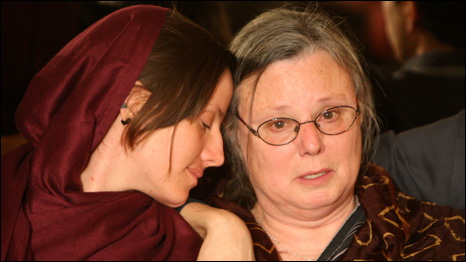James Miller is the founder of Dissected News:
On Thursday, an Iranian official told CNN, NBC, and other American press outlets that Sarah Shourd, one of three American hikers detained by Iranian officials since July of 2009, will be released “very soon.” According to our colleagues at Enduring America,
Iran Confirms Shourd To Be Released. Iranian Foreign Ministry spokesman Ramin Mehmanparast has just told Press TV, “Given that Eid al-Fitr [the celebration of the end of Ramadan, occurring on Saturday] is upon us, it was decided that this lady (Sarah Shourd) should soon be released and rejoined with her family.”
Iran, like many other Islamic nations, have a tradition of releasing some prisoners at the end of Ramadan. Also, during the 1979 hostage crisis, the first Americans to be released were women and African-Americans. Still, with the state of US-Iranian relations strained over Iran’s alleged nuclear weapons program and new economic sanctions, this move comes as a surprise to many analysts.
The burning question will now become why Iran made this move when it did. There are several possible motives for this move being circulated by Western press. The most obvious suggestion is that all attempts to use these Americans as bargaining chips for the release of Iranians in U.S. custody have failed, and Iran is attempting to ease international tension over its nuclear program. Another theory revolves around the recent high profile sentencing of Sakineh Mohammedie Ashtiani, as well as several other women, to death-by-stoning for the crime of adultery. These actions spawned international outcry, resulting in the revoking of Ashtiani’s stoning sentence (though the death penalty is still on the table).
However compelling these explanations may be, they probably only tell a small piece of the truth. First of all, the Islamic “Republic” of Iran has increasingly become about the illusion of law. These three Americans have been held, without evidence or trial, for more than a year. However, Iran’s prisons are currently filled with Iranian dissidents, politicians, and journalists who have questioned the government of Iran. It has been standard practice to hold these prisoners, with at best a show trial, for long periods of time without evidence or cause. It is also standard practice for Iran to periodically release some of these prisoners as a sign that Iran still follows rule of law. This may be the latest example.
Another possibility is that Iran is attempting to show good will towards the international community, specifically in the attempt to curry favor with Russia, Turkey, and Brazil, three nations that have been in negotiations with Iran to start a civilian nuclear program there. Russia recently signed a nuclear deal with Iran, and Moscow may be feeling the heat from a U.S. State Department that has been feeling the heat on Iran’s human rights abuses.
Though we may never know the true motives of the Iranian regime, this episode is just another example of a confused and weakened Islamic Republic. Iran’s government is in turmoil itself. Ahmadinejad’s party is at odds with his policies, equally frustrated with his inability to quell neither the Green Movement, nor the sinking economy, nor Iran’s international problems. Meanwhile, Ahmadinejad is in a constant power struggle with Iran’s democratic constitution as well as the power of the religious leaders, including the Supreme Leader. Faced with economic pressure, internal strife, political infighting, and the prospects of an Israeli (or American) military strike, Iran doesn’t seem to know whether to back down or step up.
Releasing 1 of 3 American hikers may be the hardliners’ way of holding the line while still caving to pressure, and Ramadan may be the perfect excuse to save face during Iran’s ongoing political limbo.

